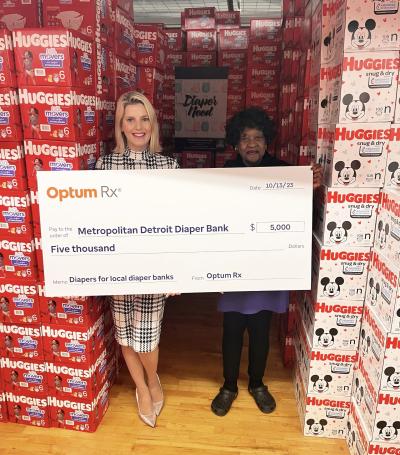
Pharmacy benefit management giant Optum Rx is aiming to address maternal and fetal health by leaning on the power of independent pharmacies.
The Bridge to Healthy Baby program launched earlier this year in three states—Louisiana, Michigan and New Mexico—and offers pregnant patients prenatal checkups and vitamins at an independent pharmacy. The initiative is part of a broader push by the PBM that seeks to harness the power of these pharmacies.
Through the program, a pregnant person who maintains their prenatal vitamins across three prescriptions or a 90-day supply will receive a care kit with key items that help during pregnancy and after the baby is born.
Optum has also deployed grants to local diaper banks to ensure new mothers have access to necessary supplies. Katie McCarey, vice president of pharmacy strategy and product innovation at Optum Rx, told Fierce Healthcare that the company has found in some markets that new mothers often have just one or two diapers available each day for their babies.
"For us, supporting these diaper banks, providing grants so that they can purchase more diapers for the underserved community was a huge aspect of this program," she said.
Over the summer, Optum unveiled the maternal health program alongside others that aimed to deploy independent pharmacies to address disparities and close care gaps. The PBM also said it would partner with local pharmacies to connect members with UniteUs, which can direct them to key social supports and services.
In addition, it announced a program that would deploy independent pharmacists to address access gaps in healthcare deserts and rural areas.
McCarey said that local pharmacists are trusted by patients, which opens the door to success in a program like that.
"I think our entire health equity product suite is really centered around that relationship with that independent pharmacist, especially in the rural communities," she said.
The program sits within a broader strategy around health equity as maternal health is a major concern in communities of color. For example, a study released earlier this year found that Black mothers living in the most vulnerable areas had far greater risk for complications or maternal mortality compared to white mothers in those same regions.
So far, while the pilot is in its early days, there is momentum within the program, McCarey said. The program will run in those three cities through the first quarter of 2024, and the company will then evaluate it to see if it wants to expand it to additional markets.
"We're just seeing a lot of positivity on the ground," said McCarey.